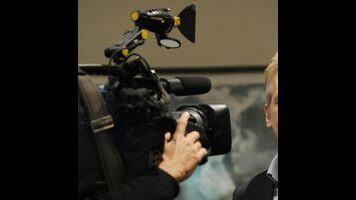The rebellion in Syria seems to occupy a position in American discourse in which it’s primarily understood as political. Some people demand intervention, and where there is debate, it’s about whether intervention is just, whether it’s possible, how to convince people it is, and how to go about it. But, at least in my experience, the escalating civil war isn’t discussed beyond those ideological terms. So if you, like me, have questions like “How is the war being fought?” and “Who are the combatants?” this Frontline episode acts as a good primer.
“The Battle For Syria” gets much of its power from its narrow focus. It’s a relatively short report, focused on Guardian journalist Ghaith Abdul-Ahad who gets smuggled into Aleppo by the rebels. He talks to them some, and then travels with them to the fighting. The framing is a little bit odd—it’s not clear why this particular Guardian journalist is the focus. Also, his cameraperson is never directly acknowledged, which gives the presentation an odd “found footage” feeling. By keeping the focus on one person and his interactions, we get an idea for what is going on on the ground.
What’s depicted is an odd combination of dense urban combat combined with semi-competent military skirmishing. The tactic is described as “street-by-street,” and the bombed-out buildings certainly give Aleppo an apocalyptic look. But the combat we see seems light. Rebels drive out in trucks with heavy machine guns mounted and fire a few times. They discuss the few mechanisms they have to defeat tanks, including homemade bombs in what look like coffee cans. Abdul-Ahad describes the rag-tag abilities of the rebels, and a rebel defector from the Syrian army discusses the simple tactics of the army—which amount to “we have a tank and you don’t.” The only dead depicted are civilians.
There are emotional moments as well. “The Battle For Syria” ends with rebels putting themselves in danger of sniper fire just to recover an imam’s body, his groceries spilled next to him. It’s not all depressing. Earlier in the episode, a Syrian soldier defects to the rebels, who then treat him as a hero, dancing with joy around him.
Yet the narrow focus is also a problem in “The Battle For Syria.” The focus is too big and the story is so far away that the details necessary to understand who is fighting and why have to be delivered somehow. (It’s possible that more context was added in post-production before air; the screener I got was pretty rough.) The main narrator tends to focus only on the immediate facts of Ghaith Abdul-Ahad’s journey. Most of the overall context is added either by another disembodied narrator voice who says things like “Through the battle in Aleppo we can see the future of the Syrian revolution,” or Abdul-Ahad himself. Abdul-Ahad’s insights, in which he directly talks about the wider context, are both rare and fascinating. He and the cameras catch an argument between the secular rebel-commander Abu Muhammed and his two Islamist counterparts. Abdul-Ahad comments that although they share a common enemy, these two factions are inevitably going to clash. The debate ends with the fighters surrounding the argument chanting “Allahu akbar!” as Abu Muhammed slinks away.
Beyond the context of the war itself, there’s also the meta-context of why “The Battle For Syria” is being shown. The debate about intervention gains more power as more people become aware of it, so in one sense, “The Battle For Syria” is inherently a piece of propaganda. Yet that potential is balanced by what I’d call a healthy skepticism. The description of inevitable in-fighting between rebel groups is a big part of that, as is Abdul-Ahad’s description of a torture session the cameraperson wasn’t allowed to witness: “…they become basically the monsters they are trying to topple.” This rebel alliance clearly isn’t the Rebel Alliance.
But perhaps the most skeptical moment comes when “The Battle For Syria” shows an older resident shouting at the rebels as they walk past his house. “Why are you destroying the world?” he asks. “We have God on our side and he [Assad?] is fighting God not the people” is the translation. It’s a confusing exchange, as the translation makes clear. Yet the translation itself may be the problem, and it reveals the issues of documentary filmmaking. Why was it translated with a recommended interpretation? Doesn’t that push the viewer toward a specific interpretation? And, if this moment is translated in this odd fashion, what does that say about the rest of the translation, narration, and editing? I don’t believe that “The Battle For Syria” is intentionally deceptive, but especially given its politically charged context, these are important questions. There are also questions that the half-hour segment is simply too short to answer. “The Battle For Syria” does what it can within those restrictive parameters, capturing some compelling footage and ideas along the way. But it’s just the beginning of a complicated conversation.


 Keep scrolling for more great stories.
Keep scrolling for more great stories.